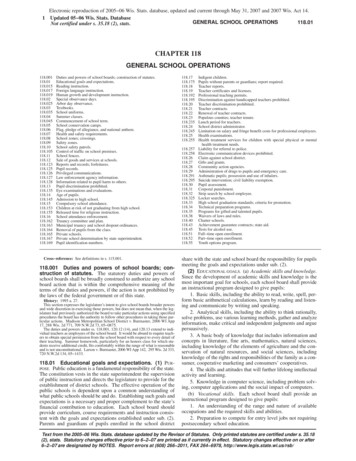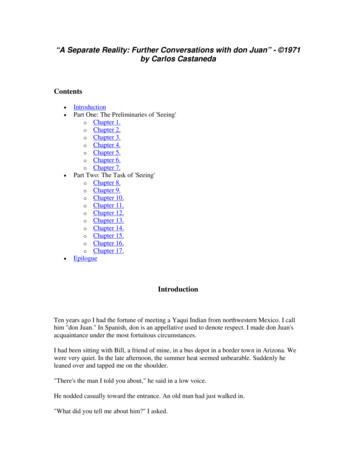
Transcription
1Electronic reproduction of 2005 06 Wis. Stats. database, updated and current through May 31, 2007 and 2007 Wis. Act 14.Updated 05 06 Wis. Stats. DatabaseGENERAL SCHOOL OPERATIONS118.01Not certified under s. 35.18 (2), stats.CHAPTER 118GENERAL SCHOOL 165118.167118.169Duties and powers of school boards; construction of statutes.Educational goals and expectations.Reading instruction.Foreign language instruction.Human growth and development instruction.Special observance days.Arbor day observance.Textbooks.School uniforms.Summer classes.Commencement of school term.School conservation camps.Flag, pledge of allegiance, and national anthem.Health and safety requirements.School zones; crossings.Safety zones.School safety patrols.Control of traffic on school premises.School fences.Sale of goods and services at schools.Reports and records; forfeitures.Pupil records.Privileged communications.Law enforcement agency information.Information related to pupil harm to others.Pupil discrimination prohibited.Eye examinations and evaluations.Age of pupils.Admission to high school.Compulsory school attendance.Children at risk of not graduating from high school.Released time for religious instruction.School attendance enforcement.Truancy committee and plan.Municipal truancy and school dropout ordinances.Removal of pupils from the class.Private schools.Private school determination by state superintendent.Pupil identification numbers.Cross reference: See definitions in s. 115.001.118.001 Duties and powers of school boards; construction of statutes. The statutory duties and powers ofschool boards shall be broadly construed to authorize any schoolboard action that is within the comprehensive meaning of theterms of the duties and powers, if the action is not prohibited bythe laws of the federal government or of this state.History: 1995 a. 27.This section expresses the legislature’s intent to give school boards broader powersand wide discretion in exercising those powers, but does not mean that, when the legislature had previously authorized the board to take particular actions using specifiedprocedures the board has the authority to follow other procedures in taking those particular actions. Madison Metropolitan School District v. Burmaster, 2006 WI App17, 288 Wis. 2d 771, 709 N.W.2d 73, 05 0875.The duties and powers under ss. 118.001, 120.12 (14), and 120.13 extend to individual teachers as employees of the school board. It would be absurd to require teachers to obtain special permission from the school board with respect to every detail oftheir teaching. Summer homework, particularly for an honors class for which students receive additional credit, fits comfortably within the range of what is reasonableand is not unconstitutional. Larson v. Burmaster, 2006 WI App 142, 295 Wis. 2d 333,720 N.W.2d 134, 05 1433.118.01 Educational goals and expectations. (1) PURPOSE. Public education is a fundamental responsibility of the state.The constitution vests in the state superintendent the supervisionof public instruction and directs the legislature to provide for theestablishment of district schools. The effective operation of thepublic schools is dependent upon a common understanding ofwhat public schools should be and do. Establishing such goals andexpectations is a necessary and proper complement to the state’sfinancial contribution to education. Each school board shouldprovide curriculum, course requirements and instruction consistent with the goals and expectations established under sub. (2).Parents and guardians of pupils enrolled in the school 18.38118.40118.43118.45118.51118.52118.55Indigent children.Pupils without parents or guardians; report required.Teacher reports.Teacher certificates and licenses.Professional teaching permits.Discrimination against handicapped teachers prohibited.Teacher discrimination prohibited.Teacher contracts.Renewal of teacher contracts.Populous counties; teacher tenure.Lunch period for teachers.School district administrator.Limitation on salary and fringe benefit costs for professional employees.Health examinations.Health treatment services for children with special physical or mentalhealth treatment needs.Liability for referral to police.Electronic communication devices prohibited.Claim against school district.Gifts and grants.Community action agencies.Administration of drugs to pupils and emergency care.Asthmatic pupils; possession and use of inhalers.Suicide intervention; civil liability exemption.Pupil assessment.Corporal punishment.Strip search by school employee.Locker searches.High school graduation standards; criteria for promotion.Technical preparation programs.Programs for gifted and talented pupils.Waivers of laws and rules.Charter schools.Achievement guarantee contracts; state aid.Tests for alcohol use.Full time open enrollment.Part time open enrollment.Youth options program.share with the state and school board the responsibility for pupilsmeeting the goals and expectations under sub. (2).(2) EDUCATIONAL GOALS. (a) Academic skills and knowledge.Since the development of academic skills and knowledge is themost important goal for schools, each school board shall providean instructional program designed to give pupils:1. Basic skills, including the ability to read, write, spell, perform basic arithmetical calculations, learn by reading and listening and communicate by writing and speaking.2. Analytical skills, including the ability to think rationally,solve problems, use various learning methods, gather and analyzeinformation, make critical and independent judgments and arguepersuasively.3. A basic body of knowledge that includes information andconcepts in literature, fine arts, mathematics, natural sciences,including knowledge of the elements of agriculture and the conservation of natural resources, and social sciences, includingknowledge of the rights and responsibilities of the family as a consumer, cooperative marketing and consumers’ cooperatives.4. The skills and attitudes that will further lifelong intellectualactivity and learning.5. Knowledge in computer science, including problem solving, computer applications and the social impact of computers.(b) Vocational skills. Each school board shall provide aninstructional program designed to give pupils:1. An understanding of the range and nature of availableoccupations and the required skills and abilities.2. Preparation to compete for entry level jobs not requiringpostsecondary school education.Text from the 2005 06 Wis. Stats. database updated by the Revisor of Statutes. Only printed statutes are certified under s. 35.18(2), stats. Statutory changes effective prior to 6 2 07 are printed as if currently in effect. Statutory changes effective on or after6 2 07 are designated by NOTES. Report errors at (608) 266 2011, FAX 264 6978, http://www.legis.state.wi.us/rsb/
Electronic reproduction of 2005 06 Wis. Stats. database, updated and current through May 31, 2007 and 2007 Wis. Act 14.Updated 05 06 Wis. Stats. Database2Not certified under s. 35.18 (2), stats.GENERAL SCHOOL OPERATIONS118.013. Preparation to enter job specific vocational training programs.4. Positive work attitudes and habits.(c) Citizenship. Each school board shall provide an instructional program designed to give pupils:1. An understanding of the basic workings of all levels of government, including the duties and responsibilities of citizenship.2. A commitment to the basic values of our government,including by appropriate instruction and ceremony the proper reverence and respect for and the history and meaning of the American flag, the Declaration of Independence, the U.S. constitutionand the constitution and laws of this state.3. The skills to participate in political life.4. An understanding of the function of organizations in society.5. Knowledge of the role and importance of biological andphysical resources.6. Knowledge of state, national and world history.7. An appreciation and understanding of different value systems and cultures.8. At all grade levels, an understanding of human relations,particularly with regard to American Indians, Black Americansand Hispanics.(d) Personal development. Each school board shall provide aninstructional program designed to give pupils:1. The skills needed to cope with social change.2. Knowledge of the human body and the means to maintainlifelong health, including:a. Knowledge of the theory and practice of physical education, including the development and maintenance of physical fitness;b. Knowledge of the true and comparative vitamin content offood and food and health values of dairy products and their importance for the human diet; andc. Knowledge of physiology and hygiene, sanitation, theeffects of controlled substances under ch. 961 and alcohol uponthe human system, symptoms of disease and the proper care of thebody. No pupil may be required to take instruction in these subjects if his or her parent files with the teacher a written objectionthereto. If a pupil does not take instruction in these subjects as aresult of parental objection, the pupil may not be required to beexamined in the subjects and may not be penalized in any way fornot taking such instruction, but if the subjects receive credittoward graduation, the school board may require the pupil to complete an alternative assignment that is similar to the subjects in thelength of time necessary to complete. Instruction in physiologyand hygiene shall include instruction on sexually transmitted diseases and shall be offered in every high school.3. An appreciation of artistic and creative expression and thecapacity for self expression.4. The ability to construct personal ethics and goals.5. Knowledge of morality and the individual’s responsibilityas a social being, including the responsibility and morality of family living and the value of frugality and other basic qualities andprinciples referred to in article I, section 22, of the constitutioninsofar as such qualities and principles affect family and consumer education.6. Knowledge of the prevention of accidents and promotionof safety on the public highways, including instruction on the relationship between highway safety and the use of alcohol and controlled substances under ch. 961.7. The skills needed to make sound decisions, knowledge ofthe conditions which may cause and the signs of suicidal tendencies, knowledge of the relationship between youth suicide and theuse of alcohol and controlled substances under ch. 961 and knowledge of the available community youth suicide prevention andintervention services. Instruction shall be designed to help pre-vent suicides by pupils by promoting the positive emotionaldevelopment of pupils.8. Knowledge of effective means by which pupils may recognize, avoid, prevent and halt physically or psychologically intrusive or abusive situations which may be harmful to pupils, including child abuse, sexual abuse and child enticement. Instructionshall be designed to help pupils develop positive psychological,emotional and problem solving responses to such situations andavoid relying on negative, fearful or solely reactive methods ofdealing with such situations. Instruction shall include informationon available school and community prevention and interventionassistance or services and shall be provided to pupils in elementary schools.History: 1983 a. 412; 1985 a. 29, 213; 1989 a. 31; 1995 a. 27, 229, 448; 1997 a.27, 35.118.015 Reading instruction. (1) PURPOSE AND INTENT. Itis the purpose and intent of this section to provide for a developmental reading program for pupils at all grade levels.(2) EMPLOYMENT OF READING SPECIALISTS. Each school district shall employ a reading specialist certified by the departmentto develop and coordinate a comprehensive reading curriculum ingrades kindergarten to 12. At the discretion of the state superintendent, a school district may contract with other school districtsor cooperative educational service agencies to employ a certifiedreading specialist on a cooperative basis.(3) DUTIES OF READING SPECIALIST. The reading specialistshall:(a) Develop and implement a reading curriculum in grades kindergarten to 12.(b) Act as a resource person to classroom teachers to implement the reading curriculum.(c) Work with administrators to support and implement thereading curriculum.(d) Conduct an annual evaluation of the reading curriculum.(e) Coordinate the reading curriculum with other reading programs and other support services within the school district.(4) SCHOOL BOARD DUTIES. The school board shall:(a) Develop a program of reading goals for the district forgrades kindergarten to 12.(b) Make an assessment of existing reading needs in gradeskindergarten to 12 in the district based on the reading goals established under par. (a).(c) Make an annual evaluation of the reading curriculum of theschool district.History: 1977 c. 29; 1995 a. 27 s. 9145 (1); 1997 a. 27.118.017 Foreign language instruction. (1) All instruction shall be in the English language, except:(a) Those programs established under subch. VII of ch. 115where instruction shall be in the English language and in the non English language of the bilingual bicultural education program.(b) The school board may cause any foreign language to betaught to pupils who desire it.(c) The school board may cause any course to be taught in aforeign language if the purpose is to facilitate the instruction ofEnglish speaking pupils in that language.(2) A school board may grant foreign language credit to apupil who has satisfactorily completed a high school course inAmerican sign language.History: 1983 a. 412 ss. 4, 5; Stats. 1983 s. 118.017; 1989 a. 280.118.019 Human growth and development instruction.(1) PURPOSE. The purpose of this section is to encourage allschool boards to make available to pupils instruction in topicsrelated to human growth and development in order to promoteaccurate and comprehensive knowledge in this area and responsible decision making and to support and enhance the efforts of parents to provide moral guidance to their children.Text from the 2005 06 Wis. Stats. database updated by the Revisor of Statutes. Only printed statutes are certified under s. 35.18(2), stats. Statutory changes effective prior to 6 2 07 are printed as if currently in effect. Statutory changes effective on or after6 2 07 are designated by NOTES. Report errors at (608) 266 2011, FAX 264 6978, http://www.legis.state.wi.us/rsb/
3Electronic reproduction of 2005 06 Wis. Stats. database, updated and current through May 31, 2007 and 2007 Wis. Act 14.Updated 05 06 Wis. Stats. DatabaseGENERAL SCHOOL OPERATIONS118.035Not certified under s. 35.18 (2), stats.(2) SUBJECTS. A school board may provide an instructionalprogram in human growth and development in grades kindergarten to 12. If provided, the program shall offer information andinstruction appropriate to each grade level and the age and levelof maturity of the pupils. Except as provided in sub. (2m), the program may include instruction in any of the following areas:(a) Self esteem, responsible decision making and personalresponsibility.(b) Interpersonal relationships.(c) Discouragement of adolescent sexual activity.(d) Family life and skills required of a parent.(e) Human sexuality; reproduction; family planning, asdefined in s. 253.07 (1) (a), including natural family planning;human immunodeficiency virus and acquired immunodeficiencysyndrome; prenatal development; childbirth; adoption; availableprenatal and postnatal support; and male and female responsibility.(f) Sex stereotypes and protective behavior.(2m) REQUIRED SUBJECTS. (a) If a school board providesinstruction in any of the areas under sub. (2) (e), the school boardshall ensure that instruction in marriage and parental responsibility is provided in the same course, during the same school year, asthe area under sub. (2) (e).(b) The school board shall ensure that instruction related to theareas under sub. (2) (e) does all of the following:1. Presents abstinence from sexual activity as the preferredchoice of behavior in relationship to all sexual activity for unmarried pupils.2. Emphasizes that abstinence from sexual activity beforemarriage is the most effective way to prevent pregnancy and sexually transmitted diseases, including human immunodeficiencyvirus and acquired immunodeficiency syndrome.(3) DISTRIBUTION OF CURRICULUM TO PARENTS. Each schoolboard that provides an instructional program in human growth anddevelopment shall annually provide the parents of each pupilenrolled in the school district with an outline of the human growthand development curriculum used in the pupil’s grade level andinformation regarding how the parent may inspect the completecurriculum and instructional materials. The school board shallmake the complete human growth and development curriculumand all instructional materials available upon request for inspection at any time, including prior to their use in the classroom.(4) EXEMPTION FOR INDIVIDUAL PUPILS. No pupil may berequired to take instruction in human growth and development orin the specific subjects under sub. (2) if the pupil’s parent files withthe teacher or school principal a written request that the pupil beexempted.(5) ADVISORY COMMITTEE. In any school district that offers ahuman growth and development curriculum, the school boardshall appoint an advisory committee composed of parents, teachers, school administrators, pupils, health care professionals, members of the clergy and other residents of the school district. Theadvisory committee shall develop the human growth and development curriculum and advise the school board on the design,review and implementation of the advisory committee’s humangrowth and development curriculum. The advisory committeeshall review the curriculum at least every 3 years.History: 1985 a. 56; 1987 a. 399; 1989 a. 203; 1995 a. 27; 1997 a. 27; 2001 a. 16;2005 a. 341, 445.118.02 Special observance days. On the following dayswhen school is held or, if the day falls on a Saturday or Sunday,on a school day immediately preceding or following the respective day, the day shall be appropriately observed:(1) January 15, Dr. Martin Luther King, Jr. Day.(2) February 12, Abraham Lincoln’s birthday.(3) February 15, Susan B. Anthony’s birthday.(4) February 22, George Washington’s birthday.(5) March 4, Casimir Pulaski Day.(5m) March 17, for “The Great Hunger” in Ireland from 1845to 1850.(5r) April 9, Prisoners of War Remembrance Day.(6) April 13, American Creed Day.(6m) April 19, Patriots’ Day.(7) April 22, Environmental Awareness Day.(7g) The last Friday in April, Arbor Day, except that if thegovernor by proclamation sets apart one day to be designated asArbor and Bird Day under s. 14.16 (1), that day shall be appropriately observed.(7r) June 14, if school is held, Robert M. La Follette, Sr. Day.(8) September 16, Mildred Fish Harnack Day.(9) September 17, U.S. Constitution Day.(9g) Wednesday of the 3rd week in September, as part ofWonderful Wisconsin Week under s. 14.16 (8), Wisconsin Day.(9r) Friday of the 3rd week in September, POW MIA Recognition Day.(10) September 28, Frances Willard Day.(11) October 9, Leif Erikson Day.(12) October 12, Christopher Columbus’ birthday.(13) November 11,Veterans Day.History: 1975 c. 204, 219, 398, 422; 1979 c. 214, 301, 355; 1985 a. 232; 1987 a.11, 16, 403; 1989 a. 146; 1993 a. 333; 1999 a. 83; 2001 a. 16, 20, 104, 105; 2003 a.305; 2005 a. 149.118.025 Arbor day observance. A school principal mayrequest one free tree provided from state forest nurseries by thedepartment of natural resources under s. 28.06 for each 4th gradepupil in the school for planting in conjunction with an annualobservance and celebration of arbor day.History: 1981 c. 59.118.03 Textbooks. (1) The school board shall adopt all thetextbooks necessary for use in the schools under its charge. Thelist of the adopted books shall be filed with the school districtclerk.(2) The school board may purchase textbooks and sell them tothe pupils at cost or it may designate agents of the school districtto sell the textbooks to the pupils. The agents, at stated times, shallmake settlement with the school district for books sold. Theagents may add a selling commission which shall not exceed 10%of the net price.(3) No dealer in textbooks may sell any books at a price toexceed 15% above the net list prices, transportation added thereto.(4) Any person violating this section may be fined not lessthan 25 nor more than 100.History: 1983 a. 412.118.035 School uniforms. (1) In this section, “school”means a public school and includes a charter school other than acharter school under s. 118.40 (2r).(2) A school board may adopt a policy that requires all pupilsenrolled in school in the school district, or all pupils enrolled inone or more schools in the school district, to wear a uniform whilein school or while under the supervision of a school authority.(3) If a school board adopts a policy under sub. (2), it shall doall of the following:(a) Establish a method whereby the parent or guardian of apupil enrolled in a school in which the policy is in effect mayexempt his or her child from complying with the policy.(b) Ensure that no pupil is penalized academically or otherwisediscriminated against because the pupil’s parent or guardian haschosen to exempt the pupil from complying with the policy.(c) Notify each parent or guardian of a pupil enrolled in aschool in which the policy will be implemented of the policy atleast 3 months before the school board implements the policy.(d) Assist economically disadvantaged pupils to obtain theuniforms.Text from the 2005 06 Wis. Stats. database updated by the Revisor of Statutes. Only printed statutes are certified under s. 35.18(2), stats. Statutory changes effective prior to 6 2 07 are printed as if currently in effect. Statutory changes effective on or after6 2 07 are designated by NOTES. Report errors at (608) 266 2011, FAX 264 6978, http://www.legis.state.wi.us/rsb/
Electronic reproduction of 2005 06 Wis. Stats. database, updated and current through May 31, 2007 and 2007 Wis. Act 14.Updated 05 06 Wis. Stats. Database4Not certified under s. 35.18 (2), stats.GENERAL SCHOOL OPERATIONS118.035(4) The requirements under sub. (3) do not apply to any schoolboard that has in effect on September 1, 2001, a school uniformpolicy for pupils enrolled in a school in the school district and hashad such a policy in effect continuously since that date.(5) By July 1, 2005, the department shall submit a report to theappropriate standing committees of the legislature under s. 13.172(3). The report shall address all of the following issues relating tothe imposition of school uniforms by school boards:(a) Methods of encouraging the involvement of the parents orguardians of pupils enrolled in a school district in a school board’sdecision to require school uniforms.(b) The ability of pupils to obtain the uniforms.(c) The effect of the imposition of the requirement on crime inthe school, including weapons possession, assault, battery, andvandalism, and on pupil suspensions and expulsions.(6) Nothing in this section affects the authority of a schoolboard to require pupils to wear uniforms for extracurricular activities, and the provisions of sub. (3) do not apply to such a requirement.History: 2001 a. 16.118.04 Summer classes. Any school board may elect tooperate summer classes or to permit pupils to attend summerclasses operated by another school district on a tuition basis if theschool district of operation will accept them. Sections 118.15 and118.16 shall not apply to summer classes. Every school boardelecting to operate summer classes:(1) Shall make rules governing attendance and cause them tobe spread on the school board minutes.(2) May accord to children living in the school district duringthe summer session the status of residents of the school district forthe purpose of attendance at summer classes, even though the children were not regular residents of the school district during thepreceding regular school session, but any such children who arenot legal residents of the state shall not be counted in computingthe state aid to which the school district is entitled.(3) May permit children from another school district to attendsummer classes upon payment of nonresident tuition.(4) Shall not charge tuition for attendance at summer classesof pupils who are residents of the school district if the school boardreceives aid for such classes under s. 121.14. The school boardmay establish and collect reasonable fees for social, recreationalor extracurricular summer classes and programs which are neithercredited toward graduation nor aided under s. 121.14.History: 1983 a. 27.118.045 Commencement of school term. (1) Except asprovided in subs. (2) and (3), beginning in the year 2000, no publicschool may commence the school term until September 1.(2) Subsection (1) does not prohibit a school board from doingany of the following:(a) Holding athletic contests or practices before September 1.(b) Scheduling in service days or work days before September1.(c) Holding school year round.(3) A school board may commence the school term beforeSeptember 1 in any school year if the school board requests thedepartment to allow it to commence the school term before September 1 and the school board includes reasons with its request.The department may grant a request only if it determines that thereare extraordinary reasons for granting it. The department shallpromulgate rules to implement and administer this subsection.History: 1999 a. 9; 2001 a. 16.Cross Reference: See also ch. PI 27, Wis. adm. code.118.05 School conservation camps. (1) To promote anunderstanding of geology, geography, conservation, nature studyand other aspects of general knowledge which are learned best byactual contact with nature itself, any school district may establish,operate and maintain and levy taxes to support individually or incooperation with other school districts or municipalities a schoolconservation camp. The camp need not be within the school district.(2) The school board of any such district may operate, contribute to the operation of, participate in the joint operation of, pay orcharge fees for the operation of the school conservation camp.The school board may admit nonresident pupils as well as residentpupils of the school district. The school board shall determine ageand other entrance requirements and the program to be offered.The camp may be operated in summer or at any other time that theschool board determines.(3) The school board may acquire, rent or accept the free useof facilities and equipment to operate the camp and may acceptprivate contributions of any kind.(4) The school board may conduct the camp on property underthe custody of other municipal, state or federal agencies when permission is granted or on private property with consent of theowner.(5) Every state agency shall cooperate in making their staffand facilities available to further the objectives of this program.118.06 Flag, pledge of allegiance, and nationalanthem. (1) Every school board and the governing body ofevery private school shall cause the U.S. flag to be displayed in theschoolroom or from a flagstaff on each school ground during theschool hours of each school day.(2) Every public school shall offer the pledge of allegiance orthe national anthem in grades one to 12 each school day. Everyprivate school shall offer the pledge of allegiance or the nationalanthem in grades one to 12 each school day unless the governingbody of the private school determines that the requirement conflicts with the school’s religious doctrines. No pupil may be compelled, against the pupil’s objections or those of the pupil’s parentsor guardian, to recite the pledge or to sing the anthem.History: 1993 a. 492; 2001 a. 16.118.07 Health and safety requirements. (1) Everyschool board and the governing body of every private school shallprovide a standard first aid kit for use in cases of emergency.(2) Once each month, without previous warning, the personhaving direct charge of any public or private school shall drill allpupils in the proper method of departure from the building as if incase of fire, except when the person having direct charge deemsthat the health of the pupils may be endangered by inclementweather conditions. The school board or governing body of theprivate school shall maintain for at least 7 years a record of eachfire drill conducted.(3) The department shall make available to school districts,private schools, and charter schools information about meningococcal disease, including the causes and symptoms of the disease,how it is spread, and how to obtain additional information aboutthe disease and the availability, effectiveness, and risks of vaccinations against the disease. The department may do so by posting the information on its Internet site. At the beginning of the2006 07 to 2011 12 school years, each school board and the governing body of each private school and each charter school shallprovide the parents and guardians of pupils enrolled in grades 6to 12 in the school district or school with the information. At thebeginning of the 2012 school year and each school year thereafter,each school board and the governing body of each private schooland each charter school shall provide the parents and guardians ofpupils enrolled in grade 6 in the school district or school with theinformation.NOTE: Sub. (3) is repealed
GENERAL SCHOOL OPERATIONS 118.01 1 Updated 05 06 Wis. Stats. Database Not certified under s. 35.18 (2), stats. Electronic reproduction of 2005 06 Wis. Stats. database, updated and current through May 31, 2007 and 2007 Wis. Act 14.











